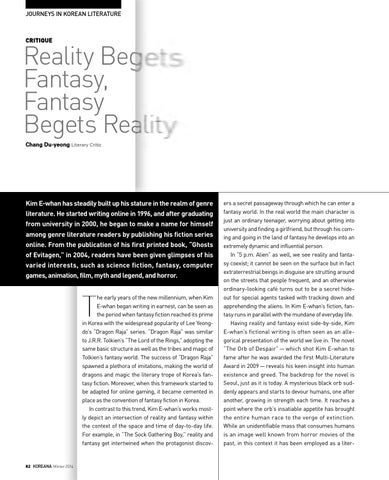JOURNEYS IN KOREAN LITERATURE
CRITIQUE
Reality Begets Fantasy, Fantasy Begets Reality Chang Du-yeong Literary Critic
Kim E-whan has steadily built up his stature in the realm of genre literature. He started writing online in 1996, and after graduating from university in 2000, he began to make a name for himself among genre literature readers by publishing his fiction series online. From the publication of his first printed book, “Ghosts of Evitagen,” in 2004, readers have been given glimpses of his varied interests, such as science fiction, fantasy, computer games, animation, film, myth and legend, and horror.
T
he early years of the new millennium, when Kim E-whan began writing in earnest, can be seen as the period when fantasy fiction reached its prime in Korea with the widespread popularity of Lee Yeongdo’s “Dragon Raja” series. “Dragon Raja” was similar to J.R.R. Tolkien’s “The Lord of the Rings,” adopting the same basic structure as well as the tribes and magic of Tolkien’s fantasy world. The success of “Dragon Raja” spawned a plethora of imitations, making the world of dragons and magic the literary trope of Korea’s fantasy fiction. Moreover, when this framework started to be adapted for online gaming, it became cemented in place as the convention of fantasy fiction in Korea. In contrast to this trend, Kim E-whan’s works mostly depict an intersection of reality and fantasy within the context of the space and time of day-to-day life. For example, in “The Sock Gathering Boy,” reality and fantasy get intertwined when the protagonist discov-
82 KOREANA Winter 2014
ers a secret passageway through which he can enter a fantasy world. In the real world the main character is just an ordinary teenager, worrying about getting into university and finding a girlfriend, but through his coming and going in the land of fantasy he develops into an extremely dynamic and influential person. In “5 p.m. Alien” as well, we see reality and fantasy coexist; it cannot be seen on the surface but in fact extraterrestrial beings in disguise are strutting around on the streets that people frequent, and an otherwise ordinary-looking café turns out to be a secret hideout for special agents tasked with tracking down and apprehending the aliens. In Kim E-whan’s fiction, fantasy runs in parallel with the mundane of everyday life. Having reality and fantasy exist side-by-side, Kim E-whan’s fictional writing is often seen as an allegorical presentation of the world we live in. The novel “The Orb of Despair” — which shot Kim E-whan to fame after he was awarded the first Multi-Literature Award in 2009 — reveals his keen insight into human existence and greed. The backdrop for the novel is Seoul, just as it is today. A mysterious black orb suddenly appears and starts to devour humans, one after another, growing in strength each time. It reaches a point where the orb’s insatiable appetite has brought the entire human race to the verge of extinction. While an unidentifiable mass that consumes humans is an image well known from horror movies of the past, in this context it has been employed as a liter-
